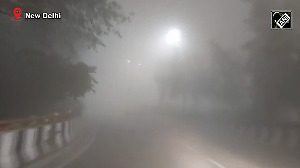Faulty laws helped oil majors -- Indian Oil Corporation, Hindustan Petroleum Corporation Ltd and Bharat Petroleum Corporation Ltd -- to avoid excise payment of Rs 713 crore (Rs 7.13 billion) to the government during April-December 2002, the Comptroller and Auditor General of India has said.
Besides, the three companies had also caused a further loss of Rs 114 crore (Rs 1.14 billion) by adopting a lower "mutually agreed price" for payment of duties by 12 terminals of these majors, the CAG said in its report on indirect taxes tabled in the Parliament.
On scrutiny of the financial records of IOC, HPCL and BPCL, CAG found that the total subsidy claimed by the three oil majors on sale of kerosene and LPG amounted to Rs 4,457.23 crore (Rs 44.57 billion) during April-December 2002.
"Duty was paid on the controlled price and subsidy received from petroleum ministry was excluded from transaction value which resulted in duty amounting to Rs 713.17 crore being lost on clearances during this period," it said.
Losses suffered by oil companies on account of clearance of kerosene and LPG at lower prices fixed by Oil Co-ordination Committee were compensated by the government through subsidies and prior to April 1, 2002 subsidies were being credited to the oil pool account and thereafter this subsidy is being paid in cash.
"Audit noticed that in the absence of specific provision to charge duty on the full value of consideration (including the part consideration received in the form of subsidy from the government), the additional consideration received from the government is excluded from levy of duty," it said.
The CAG also noticed that as three oil companies -- IOC, HPCL and BPCL -- adopted lower "mutually agreed price" for payment of duty by their 12 terminals, the government lost Rs 113.79 crore (Rs 1.14 billion).
The audit observed clearances of excisable goods at a lower value on "mutually agreed price" exhibited as "transaction value" though such a lower "mutually agreed price" did not fall within the definition of transaction value.
"The adoption of lower assessable values based on mutually agreed price at the time of clearance of petroleum products from 12 terminals of IOC, HPCL and BPCL under ten Commissionerates of Central Excise, to the terminals belonging to other oil companies and their depots (storage point) resulted in short collection of duty of Rs 113.79 crore during different periods between April 2002 and March 2003," it said.
IOC, in Chennai Commissionerate of Central Excise, cleared LPG to various oil companies on payment of duty adopting administered price during May-December 2002 despite realisation of higher value for the transaction from them.
"As APM was abolished with effect from April 1, 2002, assessment of LPG should have been determined based only on transaction value, non-adoption of which resulted in short levy of duty of Rs 3.53 crore (Rs 35.3 million) during May 2002 and December 2002," CAG said.
Indian Oil Petronas, Kasberia, in Haldia Commissionerate of Central Excise, had entered into agreement with IOC, HPCL and BPCL respectively to receive LPG from Reliance Petroleum in cryogenic condition in its refrigerated storage tanks, CAG said in the report.
Further scrutiny revealed that the assessee got terminal charges at fixed rates per tonne from the oil companies...As the assessee was doing job work, the duty in the instant case ought to have been levied on the cost of production instead of on the value fixed by supplier, it said.
It added "adoption of incorrect procedure resulted in undervaluation of such goods and short levy duty of Rs 61.33 lakh (Rs 6.13 million) during December 2001 to September 2002."






 © 2025 Rediff.com -
© 2025 Rediff.com -